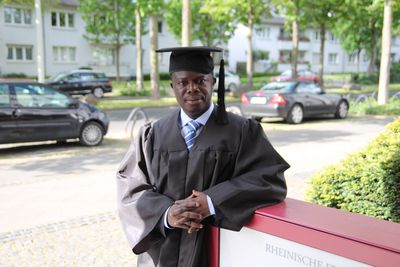Why were you interested in farmer innovations, and what exactly have you been looking at?
My PhD research was on the identification, determinants and welfare impacts of farmer innovation in rural Ghana. Research institutions have developed numerous technologies that are being disseminated to farmers for adoption. However, many smallholders do not adopt these technologies due to, inter alia, lack of accessibility, high costs, and inappropriateness of the technologies for their local conditions. Some farmers are very creative and have developed their own locally-adapted innovations to address the challenges they face. However, if you look at the agricultural innovation literature, most of the studies focus on the externally-driven innovations developed by researchers, while those developed by farmers are often neglected or under-valued. So my research, in contrast to existing studies, looks at famer innovations. I examined if farmer innovations can also play a role in the livelihoods of rural farm households, and how to build the capacity of farmers to generate more innovations.
Where in Ghana did you do your research and how long did you stay there?
I conducted my field research in the Upper East region of Ghana from August 2012 to May 2013.
The field research was carried out in the Upper East region – partly because it is one of the selected areas for the implementation of the Core Research Program of WASCAL. Moreover, Upper East is a rural region with high population density, low food security, limited infrastructural services and increasing challenges such as climate change and soil infertility, and such a challenging environment is where one expects to find many local innovations.
The first part of my research involves identification of promising innovations developed by farmers. To identify the innovations, I assisted my tutor, Dr. Tobias Wünscher who was implementing an innovation contest throughout the region between August and November 2012. In the contest, farmers competed for prizes by presenting their independently developed innovations. The top three innovators were awarded prizes during the National Farmers Day celebration. I also collected survey data from 409 farm households in three districts (Kassena Nankana East, Kassena Nankana West and Bongo) in the region. This data was used in analysing the drivers and impacts of farmer innovations.
How are farmer innovations related to climate change?
Most of the identified farmer innovations are yield-related, but these innovations are locally adapted and help to cushion the effects of climate change. Some farmer innovations also emerge in response to environmental shocks. One of the main findings of my study is that farmers who develop innovations are more resilient to climate shocks than non-innovators.
What makes farmers innovate and how do farmer innovations contribute (or not) to household welfare?
Farmers innovate out of curiosity or coincidence or the need to increase production and solve problems. I also found that a Farmer Field Fora (FFF) program, which is being implemented by the Ghana’s Ministry of Food and Agriculture, helps to build the capacity of farmers to innovate. The FFF is a platform for innovation and mutual learning among agricultural stakeholders, particularly farmers, extension agents and researchers. I analyzed the effect of farmer innovations on a number of household welfare indicators, and I found that farmer innovations play an essential role in the livelihoods of farm households. For instance, I found that farmer innovations significantly improve the income and consumption expenditure of the innovators. The innovations also contribute significantly to the reduction of food insecurity among the innovative households by increasing food consumption expenditure, and by reducing the length of the hungry season.
What were your most exciting findings?
Among the most interesting findings of my research is that farmers do not only adopt but also generate innovations. Farmer innovations may emerge by coincidence, but it can also be stimulated through capacity building programs such as the FFF. Also, farmer innovations can complement the innovations developed by public and private research institutions in addressing the challenges farmers face and in reducing rural poverty. Finally, the opportunity to win prizes through a contest can serve as an incentive for farmers to reveal their innovations instead of keeping them in secrecy.
How and when did you start your doctoral studies at the Center of Development Research (ZEF) in the WASCAL Research Program?
I started searching for PhD opportunities soon after completing my Master studies at the University of Copenhagen in Denmark. I applied to a vacancy announcement by Dr. Tobias Wünscher, who was searching for a PhD student to work on local innovations within the WASCAL program at ZEF. I was in Bonn to participate in the “Tropentag” 2011 conference, and I visited ZEF after the conference, where I met Dr. Wünscher and was invited for an impromptu interview. I later had a phone interview with Prof. Joachim von Braun and was then offered the position, which I gladly accepted.
Acknowledgements
I would like to thank the German Federal Ministry of Education and Research (BMBF) for funding my PhD studies at ZEF through the WASCAL program. I am also grateful to my supervisor, Prof. Joachim von Braun for guiding me in my research and to my tutor, Dr. Tobias Wünscher for his help in bringing my thesis to fruition.
Background
Justice conducted his research in the WASCAL work package 3.3 on Farmer’s Perceptions, led by Dr. Tobias Wünscher. He successfully defended his thesis on May 5, 2015. He has since been working as a senior researcher at ZEF within WASCAL. He succeeded Dr. Marc Müller, who started working with the Food and Agriculture Organization (FAO) in Rome.
Related publications:
Tambo, Justice A. and Tobias Wünscher 2014. Identification and prioritization of farmers’ innovations in northern Ghana. Renewable Agriculture and Food Systems, available on CJO2014. doi:10.1017/S1742170514000374
Related topics
Contact: Justice Tambo, tambojustice(at)yahoo.com


